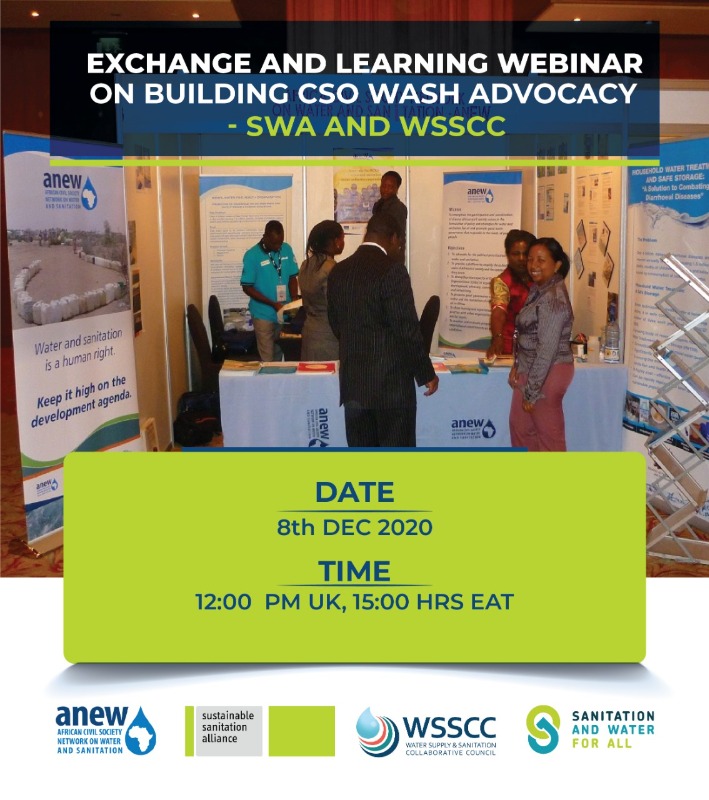- Attitudes and behaviours
- Advocacy and civil society engagement
- Webinar on building Civil Society WASH advocacy for strengthening the SWA MAM (mutual accountability mechanisms) and reaching those left behind. Presentations and summary are available!
Webinar on building Civil Society WASH advocacy for strengthening the SWA MAM (mutual accountability mechanisms) and reaching those left behind. Presentations and summary are available!
4121 views
- Keitumetse
-
 Topic Author
Topic Author- Independent consultant with interest in research, WASH knowledge management and aquatic ecotoxicology. I am an enthusiast about youth engagement and empowerment in the WASH sector.
Less- Posts: 22
- Likes received: 9
Re: Webinar on building Civil Society WASH advocacy for strengthening the SWA MAM (mutual accountability mechanisms) and reaching those left behind. Presentations and summary are available!
Dear All,
After a very insightful webinar, we found it only right to share with you the webinar presentations, summary and recording for those of you who did not manage to take part and for those who did but would still like to go back to the webinar contents for any reference.
You can access the above information via the SuSanA library
As the presentations were ongoing, a very interesting plenary discussion ensued with a few questions and responses highlighted as follows:
Chea Samnang: How do mutual accountability mechanisms work in the hard circumstances of Covid-19 pandemic?
Anjani Kapoor responded, “The need for accountability remains even during the pandemic, and in fact, there may be more opportunities for CSOs to monitor government funds that are specific for COVID-19. Covid-19 has also emphasized the need for better coordination and collaboration”.
Please see how SWA CSO partners are advocating for accountability and additional financing for the sector in COVID-context: www.sanitationandwaterforall.org/news/pu...nitation-and-hygiene
Evelyne Makena: Can Malawi please share some examples of the Non-WASH actors and how they contribute to enhance inclusive WASH.
Willis Mwandira {Malawi} responded, “Saint John of God has focused on the needs of people that have been left behind especially people with mental challenges and children with special needs. The CBO has developed innovative ways of enhancing inclusion in WASH. In prisons, for example, female inmates were plagued by poor sanitary and hygiene conditions. Key issues were lack of disposal facilities for used sanitary pads or access to sanitary materials. St. John of God taught female inmates safe re-use and disposal through lessons on sewing re-usable pads and proper disposal in an incinerator”.
Chey San- Cambodia: From the SWA Framework the role of private sector is very crucial, how do you engage private sector in your project.
In his response, Attah Benson explained that the private sector is engaged through a multi-stakeholder collaboration such as the clean Nigeria Campaign.
Jamie Myers: The research component has been mentioned in a number of examples especially on advocacy towards budgetary allocations. How willing were governments to listen and respond to negative results?
In his response, Mac Deus {TAEE}, stressed that the manner of presenting results is key with the goal being to avoid a finger-pointing approach especially with negative results. He expounded, “The network plans to present its findings-both positive and negative- on finance and budget in the upcoming sanitation conference. While the hope is that these findings will be received well by duty bearers, the network is creating an appropriate environment by sharing these results in side meetings with the key line ministries. This private discourse tactic will ensure the government will not be antagonized by a watchdog approach.
Ellyn Walter: What kind of assessments were done to understand who is marginalized and being left behind? Can anyone provide details about how they were invited or brought to the discussions? How did you balance bringing voices of the marginalized directly to the accountability process and representing their voice? Do you recommend one approach over another?
Malesi Shivaji from KEWASNET responded via the chat box. “The question of who REALLY are the vulnerable in the WASH sector is an important question in this conversation. On our part, we used the traditional way of determining vulnerability, through the lens of Geography, Governance interactions, Socio-economic status, and impacts of shocks and fragility in making a basic determination of our focus population. We nonetheless took up the deliberate action of conducting a vulnerability assessment, which will inform onward targeting and engagement in the sector.
Please do not hesitate to join in the discussion.
Regards,
Keitumetse
After a very insightful webinar, we found it only right to share with you the webinar presentations, summary and recording for those of you who did not manage to take part and for those who did but would still like to go back to the webinar contents for any reference.
You can access the above information via the SuSanA library
As the presentations were ongoing, a very interesting plenary discussion ensued with a few questions and responses highlighted as follows:
Chea Samnang: How do mutual accountability mechanisms work in the hard circumstances of Covid-19 pandemic?
Anjani Kapoor responded, “The need for accountability remains even during the pandemic, and in fact, there may be more opportunities for CSOs to monitor government funds that are specific for COVID-19. Covid-19 has also emphasized the need for better coordination and collaboration”.
Please see how SWA CSO partners are advocating for accountability and additional financing for the sector in COVID-context: www.sanitationandwaterforall.org/news/pu...nitation-and-hygiene
Evelyne Makena: Can Malawi please share some examples of the Non-WASH actors and how they contribute to enhance inclusive WASH.
Willis Mwandira {Malawi} responded, “Saint John of God has focused on the needs of people that have been left behind especially people with mental challenges and children with special needs. The CBO has developed innovative ways of enhancing inclusion in WASH. In prisons, for example, female inmates were plagued by poor sanitary and hygiene conditions. Key issues were lack of disposal facilities for used sanitary pads or access to sanitary materials. St. John of God taught female inmates safe re-use and disposal through lessons on sewing re-usable pads and proper disposal in an incinerator”.
Chey San- Cambodia: From the SWA Framework the role of private sector is very crucial, how do you engage private sector in your project.
In his response, Attah Benson explained that the private sector is engaged through a multi-stakeholder collaboration such as the clean Nigeria Campaign.
Jamie Myers: The research component has been mentioned in a number of examples especially on advocacy towards budgetary allocations. How willing were governments to listen and respond to negative results?
In his response, Mac Deus {TAEE}, stressed that the manner of presenting results is key with the goal being to avoid a finger-pointing approach especially with negative results. He expounded, “The network plans to present its findings-both positive and negative- on finance and budget in the upcoming sanitation conference. While the hope is that these findings will be received well by duty bearers, the network is creating an appropriate environment by sharing these results in side meetings with the key line ministries. This private discourse tactic will ensure the government will not be antagonized by a watchdog approach.
Ellyn Walter: What kind of assessments were done to understand who is marginalized and being left behind? Can anyone provide details about how they were invited or brought to the discussions? How did you balance bringing voices of the marginalized directly to the accountability process and representing their voice? Do you recommend one approach over another?
Malesi Shivaji from KEWASNET responded via the chat box. “The question of who REALLY are the vulnerable in the WASH sector is an important question in this conversation. On our part, we used the traditional way of determining vulnerability, through the lens of Geography, Governance interactions, Socio-economic status, and impacts of shocks and fragility in making a basic determination of our focus population. We nonetheless took up the deliberate action of conducting a vulnerability assessment, which will inform onward targeting and engagement in the sector.
Please do not hesitate to join in the discussion.
Regards,
Keitumetse
Keitumetse Tsubane
Co-coordinator SuSanA Africa Regional Chapter
(Under consultancy contract with ANEW funded by WSSCC)
Email: This email address is being protected from spambots. You need JavaScript enabled to view it.
Mobile: +266 58825940
Co-coordinator SuSanA Africa Regional Chapter
(Under consultancy contract with ANEW funded by WSSCC)
Email: This email address is being protected from spambots. You need JavaScript enabled to view it.
Mobile: +266 58825940
Please Log in to join the conversation.
You need to login to reply- Keitumetse
-
 Topic Author
Topic Author- Independent consultant with interest in research, WASH knowledge management and aquatic ecotoxicology. I am an enthusiast about youth engagement and empowerment in the WASH sector.
Less- Posts: 22
- Likes received: 9
Webinar on building Civil Society WASH advocacy for strengthening the SWA MAM (mutual accountability mechanisms) and reaching those left behind. Presentations and summary are available!
WSSCC has been working closely with the SWA Secretariat and ANEW members to engage relevant stakeholders for:
- sector coordination and collaboration, with a specific focus on engaging beyond government and development partners to effectively engage Civil Society, Research and Learning institutions and Private Sector.
- sector reviews and progress through cycles of action planning, progress review and corrective actions, based on sector processes (such as Joint Sector Reviews), global processes (like SDG monitoring through Voluntary National Reviews) and human rights processes through Universal Periodic Reviews.
Objectives:
- To provide a platform for ANEW members to come together, to share their work, the impact and learn from one another.
- For ANEW / SuSanA Africa chapter to document the learning to share more widely with members and other partners, and stakeholders.
- As WSSCC transitions into the Sanitation and Hygiene Fund (SHF), we aim to learn from the support provided and discuss how ANEW, SWA and other partners can carry forward the legacy in to 2021 and beyond.
Zoom Meeting
us02web.zoom.us/j/83787655286?pwd=SWREK3...Z3R1cU5JWjBHdlZjZz09
Meeting ID: 837 8765 5286
Passcode: 383871
Regards,
Keitumetse
Keitumetse Tsubane
Co-coordinator SuSanA Africa Regional Chapter
(Under consultancy contract with ANEW funded by WSSCC)
Email: This email address is being protected from spambots. You need JavaScript enabled to view it.
Mobile: +266 58825940
Co-coordinator SuSanA Africa Regional Chapter
(Under consultancy contract with ANEW funded by WSSCC)
Email: This email address is being protected from spambots. You need JavaScript enabled to view it.
Mobile: +266 58825940
Attachments:
-
 webinnarflyer.jpeg
(Filesize: 142KB)
webinnarflyer.jpeg
(Filesize: 142KB)
Please Log in to join the conversation.
You need to login to reply
Share this thread:
- Attitudes and behaviours
- Advocacy and civil society engagement
- Webinar on building Civil Society WASH advocacy for strengthening the SWA MAM (mutual accountability mechanisms) and reaching those left behind. Presentations and summary are available!
Recently active users. Who else has been active?
Time to create page: 0.140 seconds







